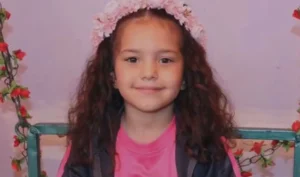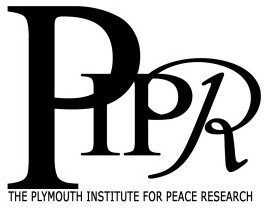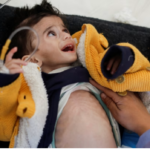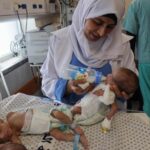Unfurling Love from the Window
By Kathy Kelly
8 May, 2024

On April 30, when Columbia University student protesters took over Hamilton Hall, they renamed it “Hind’s Hall,” dropping a large banner out the windows above the building’s entrance. This was a hall famously occupied by students in the 1968 protests against the Vietnam War and against Jim Crow racism in the United States. The students are risking suspension and expulsion, and a very real blacklist has already been generated against them, with Congress joining in to define criticism of genocide as a form of antisemitism that state universities and state-linked employers will not be allowed to tolerate.
I believe their love for Hind Rajab guides the movement so desperately needed to resist militarism. Hind was six years old when Israel used U.S.-supplied weapons to kill her.
If our civilization survives a looming ecological collapse that is helping to drive catastrophic nuclear brinkmanship, I hope future generations of students will study the “Hind’s Hall” occupation in the way that students of the civil rights movement have studied the Edmund Pettus Bridge and the story of Emmett Till. Hind’s story is tragically emblematic. Her cruel murder has befallen many thousands of children throughout the decades of Israel’s fight to maintain apartheid. Just in our young century, from September 2000 to September 2023, Israel’s B’tselem organization reports that 2,309 Palestinian minors were killed by Israelis and some 145 Israeli minors were killed by Palestinians, with these numbers excluding Palestinian children dead from deliberate immiseration via blockade or traumatized as hostages in prisons. We hear reports that thirty-eight Israeli children and some 14,000 Palestinian children have been murdered since October 7, deaths which can all be laid on the doorstep of the ethnostate project so lethally determined to keep one ethnicity in undemocratic governance.
No six-year-old poses any threat to anyone. Like the hundreds of thousands of Iraqi children starved to death during the U.S. imposition of economic sanctions against Iraq, none of these children could be held accountable for the actions of their government or military.
Hind Rajab committed no crime, but she was made to watch her family die and wait for death surrounded by their corpses. When the ambulance crew asked safe passage to come rescue her, she was used as bait to kill them as well. Her story must be remembered and told over and over.
As Jeffrey St. Clair writes, Hind was a little girl who liked to dress up as a princess. She lived in the neighborhood of Tel al-Hawa, an area south of Gaza City.
“Hind Rajab was in her own city when the invaders in tanks came,” St. Clair notes. “What was left of it . . . Hind’s own kindergarten, from which she’d recently graduated, had been blown up, as had so many other schools, places of learning, places of shelter and places of safety in Gaza City.”
On January 29, when the Israelis ordered people to evacuate, her mother, Wissam Hamada, and an older sibling set off on foot. Hind joined her uncle, aunt, and three cousins who traveled in a black Kia automobile.
The uncle placed a call to a relative in Germany which initiated the family’s contact with the Palestinian Red Crescent Society (PRCS). After the initial connection with the PRCS switchboard, the car was targeted and hit, killing Hind’s uncle, her aunt, and two of her cousins.
Hind and her fifteen-year-old cousin, Layan, were the only survivors.
Switchboard operators handling the phone contact with Layan had immediately notified ambulance workers that the little girls needed to be rescued.
But it would have been suicidal for a rescue crew to enter the area without first working out coordinates with the Israeli military.
Similar to the World Central Kitchen workers killed on Monday, April 1, they waited hours for the coordinated rescue plan.
On the audio tape shared by the PRCS workers, Layan’s petrified voice can be heard. The tank is coming closer. She is so scared. A blast is heard and Layan no longer speaks. PRCS workers call back and Hind answers.
She pleads, “Please come and get me. I’m so scared.”
St. Clair writes, “The [PRCS] dispatched an ambulance crewed by two paramedics: Ahmed al-Madhoon and Youssef Zeino. As Ahmed and Youssef approached the Tel al-Hawa area, they reported to the Red Crescent dispatchers that the IDF was targeting them, and that snipers had pointed lasers at the ambulance. Then there was the sound of gunfire and an explosion. The line went silent.”
The tank-fired M830A1 missile remnant found nearby had been manufactured in the United States by a subsidiary of the Day and Zimmermann Corporation. Day and Zimmermann prides itself on having once received the U.S. National “Family Business of the Year” award—an Internet search for the award chiefly produces references to this company. The company states that it believes in civic and community service, with core values of safety and integrity; emphasizing their success as a team that hits its targets. But since last October, their business has been killing families like Hind’s.
Although Israel predictably insists that Layan and Hind, and the additional slain paramedics, were all lying with their final breaths and that no IDF tanks were present to attack them, Al Jazeera’s analysis of satellite images taken at midday on January 29 corroborates the victims’ accounts and puts at least three Israeli tanks just 270 meters (886 feet) from the family’s car, with their guns pointed at it.
When rescuers were finally allowed to approach the remains of Hind and her family on February 10, the car was riddled with bullet holes likely coming from more than one direction.
Hind’s mother couldn’t go to the site until February 12.
On May 5, Israel raided the offices of Al Jazeera at the Ambassador Hotel in Jerusalem and moved to shut down the television network’s operations in Israel.
To remember Hind’s story is an act of resistance. Commemorating her short life builds resolve to confront profiteers who benefit from developing, manufacturing, storing, and selling the weapons that prolong wars—robbing children of their precious right to live.
Universities should, in theory, be places to learn things of importance, and we can learn from the students of Hind Hall to throw comfort and ambition out the window while keeping hold of love, as the students clung to that banner and to the name of Hind Rajab. We can learn to keep hold of our humanity. We learn by doing, as these students are learning to do, drawing wisdom from people like Phil Berrigan who famously said, “Don’t get tired!”
The list of Gaza solidarity encampments grows each day. Conscious of increasing famine in Gaza, students at Princeton University launched a water-only fast on May 4 as they continue to call for their University to divest from corporations selling weapons to Israel. The United Nations warns of a potential collapse of aid delivery to Palestinians with Israel’s May 7 closure of the two main crossings into Gaza. These crossings are critical entry points for food, medicine, and other supplies for Gaza’s 2.3 million people. The disruptions come at a time when officials say northern Gaza is experiencing a “full-blown famine.”
With thousands of innocent lives in the balance, promoters of peace should take advantage of this crucial opportunity to follow the young people, learning alongside the students whose hunger for humanity reveals stunning courage.
———-
Kathy Kelly ([email protected]) is board president of World BEYOND War and a co-coordinator of the Merchants of Death War Crimes Tribunal
This article first appeared in The Progressive Magazine





